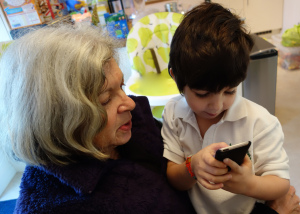How old is a child when he realizes that his Grandma - or Bubbe or Nana or Gaga - is actually his own mother’s mother? I have forgotten this. I don’t mean how old is he when he can correctly identify the person in question or use the right words to describe the relationship. I mean how old is he when he can understand the true import of the lineage. It has to be somewhere between two and five years, between my daughter’s singsong repetition of the fact that the woman who gave birth to me is her ‘mommy’s mommy’ and my son’s solemn insistence that at one point I was in that same woman’s tummy, just as he was in mine.
It’s the grasping of the analogy that is crucial: Grandma is to Mommy as Mommy is to me. Most kids get the bare bones of it by four, I would imagine, but it takes so much longer to fully absorb the significance. Sometimes it takes too long. I didn’t ‘get’ it until I became a mother myself and my grandparents were all gone. I have memories of them, to be sure, of being carted to dinners and, ultimately, to deathbeds. I can still smell the lingering smoke and the Swedish meatballs and the candy store in the Bronx. But I never saw them when they were alive, really saw them, as the people they were to my own mother. What scares me about this is the awareness that, in all likelihood, my children will not be able to see my parents that way either.
Maybe it doesn’t matter. You can certainly love the people two generations up without knowing what they mean to the people one generation up. For me, though, the knowledge has re-colored the history. I imagine my mother as she was back then, knee-deep in raising small children, flushed by the importance of it all, and I feel a slight sense of panic when I look at her now. Because I remember myself as one of those small children and how peripheral, despite best efforts, my grandparents were to me. I want it to be different for my kids.
I don’t know if this is in my control or for how long. It’s true that a large part of the dynamic between young kids and their extended family members is mediated through the parents themselves. At the heart of it is how close you are to your own parents and how much care you take to weave their existence into your day-to-day life. There are Skype sessions, there are Sunday lunches, there are sleepovers. But there are other variables too, ones that aren’t always in your hands: age and physical distance, to name just two.
There is the also the variable of how much the grandparents want to be involved. Some would be there - some are there - week in and week out, as hands on as you can imagine. Changing the diapers, running the baths, doing the night shifts and the early morning ones too. They see their grandchildren as an extension of their own parenting experience, another chance to contribute to the raising of new people, the wonders and the challenges alike. Others take a different view. They see the birth of the next generation not as an opportunity to do it all again, but as an opportunity to do it differently. When they are with their grandkids, they don’t want to operate in loco parentis. They want to enjoy the unique relationship that comes with the prefix ‘grand’, the intimacy without the burden of absolute responsibility. And then they want to give the kids back at the end of the day.
As much as I watch, in my mind, the movie of my mother in the past, I also watch the one of myself in the future. I think about what it will be like for me in 20 years, in 30 years, in 40 years when Oliver has a family or Phoebe does and I am the grandma, if fortune so descries it. What kind of grandma will I be? What kind of grandma will I be allowed to be? Will it feel different to be the grandmother to my daughter’s children than to my sons’?
Whenever I consider this last question, I am reminded of the saying: ‘a son is a son till he takes a wife, a daughter’s a daughter for the rest of her life’. It doesn’t apply universally, I know that; it’s outdated, I know that too. But as with all aphorisms, it nurtures a kernel of truth. It plays on the stereotypical difference between males and females in terms of their interest - or perhaps ability - to keep in touch with those that are not on their immediate radar. In this arena, as in others, I will keep my fingers crossed that my sons defy their gender. Or failing that, I will keep my fingers crossed that the person they choose to have children with does the work of keeping in touch for them.
Hope as I might, the issue of access is still a serious one. Because with young children it is something that has to be granted. It is something also that takes commitment on both sides, especially given the bustle of our ever busy lives. We make the effort and thanks to the wonders of the webcam even my two-year-olds have an unmistakable bond with their relatives who live 3000 plus miles away. And my seven-year-old is bridging distances as well: he has just taught my mom how to text.
He sends her messages now that say ‘I love you’, I believe that he does. That they all do. The older ones for her conversation and her games and the gifts she gives. The younger ones for her treats and for the nondescript - but fundamental - way she must remind them of me. Maybe they don’t ‘know’ she is their mommy’s mommy, not yet. But the more I think about it, the more I realize they have still managed to grasp something of that connection instinctively. Or why else would they mistake her voice for mine on the answering machine.


